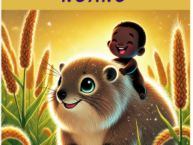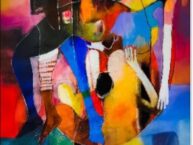BEAVEN TAPURETA
HARARE, ZIMBABWE: Prolific Zimbabwean writer and poet Oscar Gwiriri is proud of his mother tongue, Shona, which he is doing his best to preserve through writing and defending it from being diluted by modern communication technologies and other forces.
Shona is one of Zimbabwe’s sixteen official languages and is spoken in five major dialects: Karanga, Zezuru, Korekore, Manyika and Ndau.
Literature in Shona is historically impressive with a long list of giants who are remembered today for hatching brilliant novels, poetry, and other forms. Many Zimbabweans would ever want to read again and again the books that implanted everlasting memories in their minds, such Shona classics as Pfumo Reropa, Tambaoga Mwanangu, Makunun’unu Maodzamoyo, Ndakamuda Dakara Afa or Pafunge?
However, with the coming of new technologies, the future of the indigenous language seems vague.
While the digital world has presented multiple opportunities for the writer, it has also come with unfortunate conditions.
The forces moving against our indigenous languages are many, and the outcry still echoes near and far. Not only Shona has suffered the blows, but also its counterpart Ndebele.
In one of my Bookshelf instalments in the Herald back in 2014, I spoke with a number of established Ndebele writers about the diminishing dignity of local languages and one of them, Pathisa Nyathi, a renowned cultural fundi, historian and publisher, blamed the denigration on the retrogressive mindsets sown by colonialism.
One can only conclude that English language, a psychological weapon so supreme used by the colonizer, stole the happiness away from the language of the African.
However, the fight to liberate the mother tongues continues as writers are still writing, publishing, and speaking out. On social media, the writers have formed groups with a common interest to celebrate their beloved language – an important cultural heritage.
In a recent exclusive interview, Gwiriri expressed concern over the damage being done to the language by social media which he says is eroding cultural dignity.
“A majority of Shona writers are discouraged by how publishers and society look down upon it in favour of English. So the Shona works are threatened with extinction, worse still with the trending social media novel groups with stories of a mixed language,” he said.
As a budding writer, Gwiriri had a dream to write for the international reader and English language seemed to be the vehicle for success. Truth soon caught up with him, he says he discovered that “a good book written in vernacular can still be translated into multi-languages”.
The limitation of English language, he added, also lies in its inability to tackle certain African themes.
“There are certain themes better tackled in indigenous and endogenous languages than in English. Shona is my mother language, and abandoning it for any other language is tantamount to self-loathe. I was enlightened when I travelled abroad and realised that some people in other countries were so proud of their own languages and never bothered to perfect their English when communicating. I then asked myself why I can’t do the same. Writing in Shona is a sign of my belonging to my people, preservation of our culture and tradition in its original form. I am proud to be a Zimbabwean. My language comes first before any other when it comes to writing. I am not writing just for today, but for tomorrow and eternity. I wish our grand-grand children to have access to pure and undiluted Shona, not street lingo, just as much as we are currently having it from the books of the likes of Hamutyinei, Chakaipa, Mutasa, etc. We should be proud of our indigenous languages rather,” said Gwiriri.
Imagining Shona or Ndebele being reduced to informal street lingo cannot be taken for granted. There has been a growing number of groups on social media which spread hurriedly written soft ‘novels’ that have the characters or narrators un-stylistically mixing languages. Ignorance is one of the ills of self-publishing and a critical investigation into drab Shona novels is taken as censorship by the so-called ‘Whatsapp authors’. It happens even with books meant for the children and the double-damage is unavoidable.
Some time ago, a book reviewer in the Chronicle wasn’t happy with Wellington Kusema’s primary school Shona textbook title ‘Success in Shona’, which he found “not appropriate”. Instead, he suggested ‘Budiriro muShona’.
“It strikes one as being odd that a Shona textbook would have an English name as Kusema has chosen to name his book ‘Success in Shona’. Could it be that the mother tongue is dying a natural death?” the book reviewer wondered.
There are newly released Shona books being advertised almost weekly on social media paradoxically portraying a rise of Shona literature. Yet there are no official book statistics and what’s more, there is serious lack of serious reviews (not advertisements) which could give a serious reader a taste of the quality within the books that are ‘trending’.
Mixing languages in a single literary work is allowed but it needs an enlightened writer to know the strategies.
Gwiriri admits Shona is a complex language and perhaps that could explain why most budding authors and publishers shun it. To be able to edit a Shona literary work one has to at least master its compound elements or variations.
As for him, he treats his language with special care and patience, engaging professional editors and proofreaders.
“Shona has its own complexities, worse still when you have not formally done it at school, just like me. You really need to know the area you are writing about, thus your grammar, choice of words, tone and age you are writing about (new or old world). To help me, I engage many relevant Shona proof-readers (teachers) to go through my manuscripts before I send them to publishers. …Shona seems to be easily spoken than written, though most speakers hardly complete a sentence without mixing it with English or slang…. However, as Shona writers, we will not bow down to the social pressure of converting it into street lingo. We will continue to write pure Shona for whatever smaller segment of those interested in preserving its purity and vocabulary. As for me, I will not tire to research, write and archive the Shona systems I would have been inspired by, systems which inspired the ancestors,” said the author of the masterpiece Hatiponi and several other Shona works.
The number of Gwiriri’s works published in Shona confirms his passion for the language. He has greatly inspired new writers with whom he shares his skills and knowledge and advocates for the restoration of order in indigenous language fraternity.
Although he has few works published in English language in magazines, newspapers and anthologies, his mother tongue always calls him back.
With more than thirty books to his name so far, Gwiriri takes his writing job as near to being spiritual. Asked how he creates and where he draws his inspiration, he said he is touched most by humanity, by the degeneration of nature and culture, family conflicts, inter/intra-personal conflicts; he observes or researches everything around him.
“I am more of a social researcher. More to that, I am gifted with dreams. I sometimes wake up at night to scribble what I would have dreamt. There are times when I am spiritually drenched in the ancient world, especially when I am writing an old world novel. Thereafter, I even wonder about what I would have written about. I may say there is a writing spirit in me which formulates what I write about, and gives me the energy to write. I feel pushed to write, and if I dishonour it or attempt to suppress it, I feel restless. I hear compelling voices telling me to put something down. I jot down whatever comes into me on my mobile diary, even when I am walking on the street or travelling. There are too many things which come into my mind at any given time. I thank my ancestors for gifting me with multi-tasking skills. I am able to balance my work, my social life and writing with much ease. I have too many draft novels and titles on my table. Creativity is like breathing to me, so effortless.”
The old world novel form has been his greatest exploration. The 48-year old novelist says that even in those novels which he considers ‘modern’, the old world traits still appear. Examples of such novels that combine the old world and modern are Honzwa, Mapininga-pininga, Shumbarutombo and others.
Not only has Gwiriri become a role model for upcoming Shona writers across the country but also in his own family he has nurtured writing talent. His son, Onald Gwiriri, broke record for becoming the youngest NAMA winner (10 years old then) with his book The Cursing Tortoise scooping the Outstanding Children’s Book award last year (2022).
He has an impressive list of published works most of them written in Shona. Actually, he has published seven Shona novels, a play titled Kudyiwa Munyati, three short story collections, eleven poetry collections. His name has featured in twenty three anthologies, mainly poetry, and he has made substantial output in children’s literature, with twenty titles and one of them Chitima Nditakure was nominated for a NAMA award in 2019, the same year his novel Hatiponi was also NAMA-nominated.
Born in 1975 in Mutare, Gwiriri’s long literary journey tells of a writer who has remained true to his own calling. Outside of writing, he is a Certified Forensic Investigations Professional (CFIP). He holds Master of Science in Strategic Management degree, Bachelor of Business Administration, Diploma in Logistics and Transport (CILT, UK), Diploma in Workplace Safety and Health, and a Commanding United Nations Peacekeeping Operations Certificate.




1 comment for “PROLIFIC WRITER FIGHTING FOR SHONA LANGUAGE DIGNITY”